





















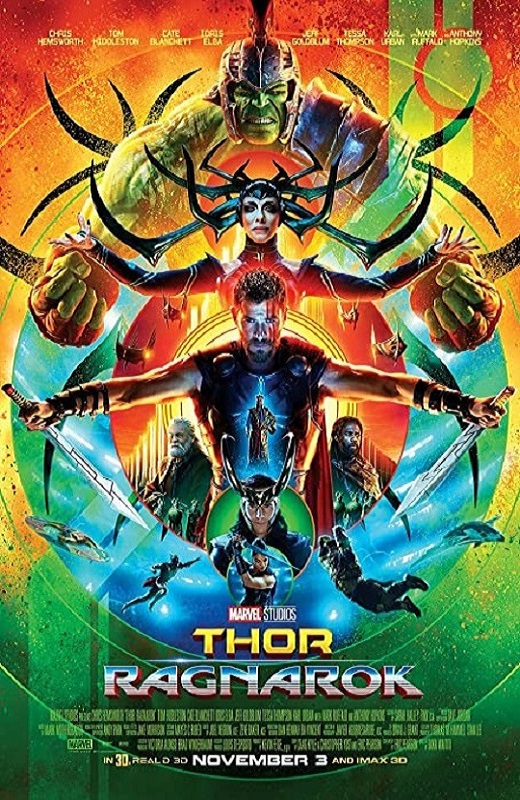
17 – Thor: Ragnarok
This is, I believe, largely regarded as the best of the Thor movies in the MCU, and I have to agree. Not only was it a great superhero movie, it was just a great movie. Chris Hemsworth really is the perfect actor to play the God of Thunder. He is incredibly handsome, amazingly fit, and is a pretty darn good actor to boot. By this time, he owned the character, and I can’t imagine anyone else playing the part. He is amazing! He can do the drama, the action, the humor, and everything in between. It was great to see the continuation of Thor’s journey. He endures more personal loss than any other MCU Character. In this movie alone, he loses his father, his hammer, his freedom, his home, and his eye. But he still refuses to give up.
Next, you add in veteran MCU actors like Tom Hiddleston playing Loki, Anthony Hopkins playing Odin, and Mark Ruffalo playing Bruce Banner, aka, the Incredible Hulk. After that, we get a few other familiar characters in Benedict Cumberbatch as Dr. Strange, and Idris Elba as Heimdall. But then we get a few really big names to play new characters like Karl Urban, Jeff Goldblum, and we get a powerful performance from Cate Blanchett, playing the film’s big villain, Hela, the Goddess of Death. Another new character with a new face is Tessa Thompson as Valkyrie, a really kick-ass woman.
The MCU has often been criticized for its underdeveloped villains, and to a certain extent, I agree. But despite that, Blanchett did a fantastic job. She was so powerful and evil that she was basically undefeatable. She had the ability to manifest an infinite number of weapons to fight with, and was as durable as any Asgardian. She killed off the Warriors Three pretty early in the movie, and most of the Asgardian palace guards, without even breaking a sweat. She looked fantastic, and the giant Hela headdress that seemed to grow right out of her head was so cool! In the end, the only way the heroes could defeat her was to summon the ancient demon Surtur, and allow him to utterly destroy Asgard, the source of Hela’s power. And that’s where we get the movie’s title, Ragnarok, the event in Norse mythology, the Fall of the Gods.
The visual effects on the Hulk were incredible. The plot heavily featured the Hulk, and the realism achieved in the computer generated image of the big green guy was stunning. It just seems that his every movie appearance gets an upgrade. Not only does the impossibly large monster look as real as the live actors, it is easy to see Mark Ruffalo’s face in the image. And though green isn’t a natural skin tone, it looked just as good as a live actor wearing green makeup. And Ruffalo was just as good as Banner as he was as the Hulk. The fight in the Grandmaster’s arena was one of the best parts of the whole movie.
Jeff Goldblum also did a fantastic job. The character of the Grandmaster seemed to allow the actor to play himself, like I’ve seen him in interviews and such, but it fit the film. I did a little reading, and found that he and the Collector are members of an ancient race called the Elders of the Universe, and are apparently some of the oldest living beings in the universe, coming from one of the first intelligent races to evolve after the Big Bang. Interesting.
This movie also featured two scenes in which Thor goes into full God mode. In the gladiatorial arena and during the climactic battle with Hela and her forces of resurrected ancient Asgardian warriors, Thor’s eyes start glowing white, and he unleashes his most powerful lightning. Despite losing Mjolnir to Hela in her introductory scene, which showed just how much of a total bad-ass she was, Thor is able to prove that he is nearly as powerful. And he just looks so cool when his eyes start to glow! Oh, and they gave him an awesome new haircut, too! Thor has always been one of my favorite MCU characters, and Ragnarok only serves to strengthen that opinion.
Top 10 Favorite Parts
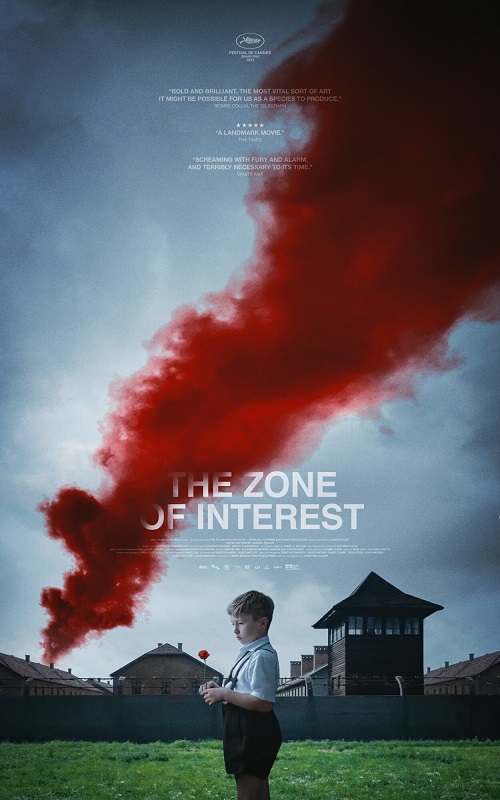

2023 – The Zone of Interest
This movie was ok. It kept my interest well enough while I was watching it. But the more I think about it, the more I am of the opinion that it was way too slow, way too self-important, and was trying way too hard to be deep or emotionally impactful. What it was, was an examination of yet another perspective on the absolute tragedy that was the Holocaust. I think the reason it was able to keep my attention is that I have never seen a film about that terrible time in history, told from this particular perspective, that of the Auschwitz commandant, Rudolf Höss and his wife Hedwig, who live with their family in a home in the “Zone of Interest” next to the concentration camp.
The film seemed to be extremely minimalist. The viewer sees it as a fly on the wall. The actors almost never played to the camera, which was generally in a fixed position, while the characters came in and out of the frame, going about their daily lives. There were three colors that were used in very specific ways in the film, white, red, and black. There were three times in the movie in which the entire screen turned those colors for long stretches. White: thirteen seconds, while we listened to the screaming and crying of people that we never see. Red: twenty-one seconds, while we listen to a man screaming, as if being tortured, and is abruptly cut off into silence. Black: at the end of the film, a full sixty seconds, right before the end credits, as we listen to incredibly dissonant music that sounded like orchestrated wailing and lamenting.
That was just one example of how the film was trying too hard to be deep. Was it really effective story-telling, good filmmaking, or just pretentious and heavy handed? I don’t know. And there were other things that were, I think, supposed to be emotionally jarring, but for me, were only effective in slowing down the narrative, sparse as it was. But it wasn’t all ineffective. There were some things that were meant to be disturbing, and actually were, in a very meaningful way.
The story, what there was of it, can be summarized quickly. Höss and Hedwig have a beautiful home and a beautiful family. They are happy and healthy. But they live next to Auschwitz. Their home is beautiful as long as they can ignore what is going on over the wall, the frequent screaming and gunshots, the smell of the smoke coming out of the slaughter-houses. Hedwig gets regular deliveries of beautiful things like a fur coat, or lipstick, or a diamond found hidden in a tube of tooth-paste, even though she knows perfectly well where they are coming from. But she accepts the deliveries, because they only belonged to Jews.
One day, Rudolph gets transferred, and rather than move out of her dream-home, Hedwig chooses to stay. Rudolph is promoted to deputy inspector of concentration camps, and the loving couple are parted. At Auschwitz, the killing and the death gets ramped up, and the sounds of trains increases. Höss, himself, was shown to be an integral part of the mass genocide. The end of the film was pretty impactful. To quote Wikipedia, “As Höss leaves his Berlin office and descends a stairway, he stops, retches repeatedly and stares into the darkness of the building corridors. In the present day, a group of janitors cleans the Auschwitz-Birkenau State Museum. Back in 1944, Höss continues downstairs, descending into darkness.”
And that’s what this movie does so effectively. It sheds light on the level of both denial and indifference that was perpetrated by the German Nazis and their families, and yet shows that they were humans, too. They were normal people with hopes and aspirations, loves and cares, just like anyone. Were they good people? Were they evil? At the very least, Rudolph was shown to have a conscience, at the end. He was aware that he was a monster, and yet his awareness didn’t stop him from being that monster. And did Hedwig’s heartless indifference to her husband’s work and the nearby suffering at the concentration camp make her just as bad?
This was a dark movie, and though it was based on real people and events, I don’t mean just the content. I mean that the images on the screen were sometimes very dim and barely lit. There were a few sequences showing a young Polish girl hiding food for forced laborers at night, that were shown in black and white negative, so that the girl was white, and everything around her was black. It was done for effect, but it was just another way to force the emotional content. It was interesting, but very dark on the screen. Also, the movie was entirely in German. I don’t mind reading subtitles, but sometimes they were too fast for me to read, and I had to rewind just a little bit to understand what was being said.
And finally, I have to quickly mention the acting of the two leads, Christian Freidel as Rudolph, and Sandra Hüller as Hedwig. They were both good, but I particularly liked Hüller, and found it interesting that she was also in another Best Picture nominee for 2023, Anatomy of a Fall, for which she was nominated for Best Actress. She apparently had a busy year, and I’m glad she was recognized for her work. And though this didn’t win the Best Picture award, and I’m glad it didn’t, it did win the Best International Film Oscar, and that’s good.
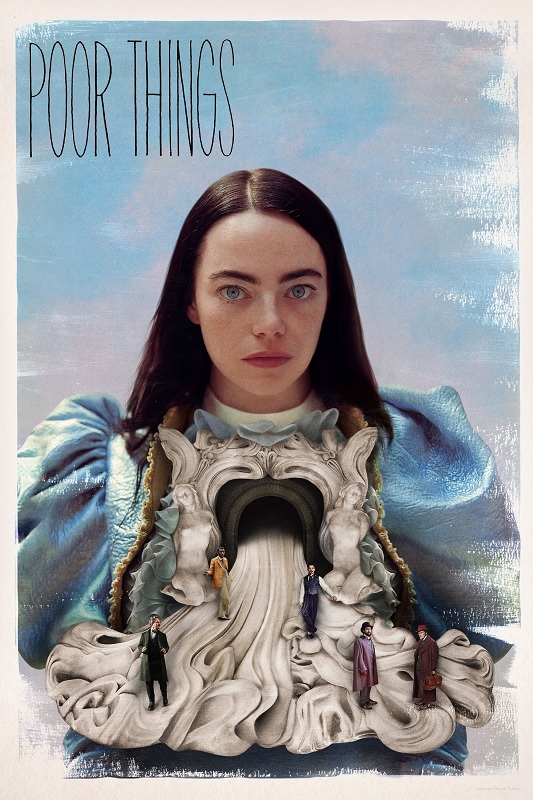

2023 – Poor Things
This was a strange, strange movie. I ultimately enjoyed it, but I had to do a bit of research to really understand its themes and messages, and what it was trying to explore. It was a surrealistic fantasy, an examination of a certain kind of feminism, but told from a male perspective. The reviews I read are conflicted. Is the movie feminist, or is it really sexist? Is it about female empowerment, or is it about that within the confines of a man’s world? Any way you look at it, it is a unique movie. The acting was incredibly good, the visuals were stunning, the costumes were phenomenal, the cinematography was outstanding, and the pseudo-steampunk aesthetic was captivating. Even the music was strange and memorable, much of it sounding like a wonky, broken jack-in-the-box tune, with disturbing, sliding guitar sounds and chaotic orchestra hits. There are so many things about this film that were just fascinating to see and hear.
The plot was a bit of a Frankenstein story. Dr. Godwin Baxter, a scientist, played by Willem Dafoe, hires a young colleague, Max McCandles, played by Ramy Youssef, to observe and document the development of a young woman who, as it is later revealed, has the body of an adult woman, but the transplanted brain of an unborn infant, and not just any infant, but her own. Bella, brilliantly played by Emma Stone, has virtually no knowledge of the world outside of Godwin’s house. She discovers sexual desire with the unscrupulous Duncan Wedderburn, played by Mark Ruffalo, who convinces her to run away with him for a sex-filled adventure around the world. The film follows Bella as she goes on a journey of self-discovery and experience. She rapidly grows from an infant to a questioning child, and by the film’s end, she becomes a confident and self-determined adult.
This is what made Emma Stone’s performance so incredible. She starts out experiencing the world like a newborn peeing on the floor, a toddler banging on a piano, a child smashing plates for fun, a teenager discovering sexuality, a young woman running off to explore the world, and finally, an adult, deciding the direction of her life. She meets people who introduce her to sex, art, philosophy, human suffering, pain, and pleasure. But she takes it all in with the curiosity of one who is hungry for knowledge and self-improvement. Stone was simply brilliant in every aspect of that journey. She played each stage of that growth with such precision that you could follow the progression with ease, and it was fascinating to watch.
All the men in the film interact with Bella in terms of control, because apparently, that is what all men do with all women. They all want her to be what they see as the perfect companion. Dr. Baxter wants the control of a parent, Max, that of a sweetheart, Duncan, as a lover, the johns of the brothel as a whore (I’ll get to them in a moment), and the husband from her previous life before the brain transplant, Alfie Blessington, played by Christopher Abbott, as an actual possession.
The visuals of the film were amazing. The fantasy steampunk look of every scene was impressive. The images on the screen were beautiful. The use of color and light were captivating on the screen. Much of the film was done in black and white, finally blooming to color as Bella’s understanding of the world blossomed. And that leads us into the amazing costumes. Bella was a girl who had no concept of social conventions, and was unashamed of her avaricious desires for experience and sex. These things were reflected in the clothes she wore. The colors matured from innocent whites and baby blues to more mature reds and blacks. And boy, did they ever lean into the gigantic puffy shoulders of the Victorian era! But I actually liked that. It really lent itself to the fantasy of the film.
And did I mention she loved sex? Actually, this was one of the film’s… I won’t call it a flaw… but one of its more unsettling elements. The explicit sex scenes were a little too frequent. One of the major plot points in the narrative is where Bella is in need of money, and discovers that she can earn cash by doing something she loves doing: having sex. She has a lot of it, and we see a lot of it. We see full frontal nudity of not only Emma Stone, but also of a few them men who come to the brothel in which she becomes employed. True, this movie doesn’t acknowledge the reality and emotional ramifications inherent in the life of a sex-worker, and some critics have remarked on this lack of sensitivity, but the movie is a fantasy, an allegory, a metaphor. What do you want?
And finally, there were two last things I really liked about the film. First, it was an epic. It followed Bella around the world, growing and becoming, and taking us on that journey with her. It transcended time and location, and I do so love a good epic narrative. Second is that it is a great example of a black comedy. It dealt with mature, adult themes, and the things that happened were not realistically funny. But there was enough actual comedy that made me laugh internally, if not out loud, like the scene where Bella dares a drunk Duncan to throw a lady off the side of a ship, and he actually tries to do it. And Martha, the lady in question, is actually amused that her life has come to end in such a murder. Or the bizarre ending where Bella transplants the brain of a goat into Alfie’s head, and we see him bleating and eating leaves. That was some funny stuff.
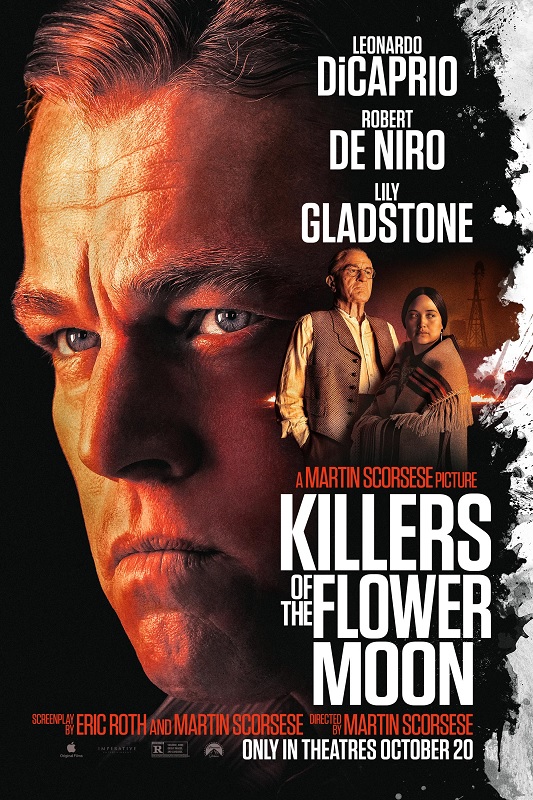

2023 – Killers of the Flower Moon
This was a very good movie, but it was way too long. Those two things are not mutually exclusive. The story could have been told in around two hours, but director Martin Scorsese drew it out to over three and a half hours. But that’s really my only complaint about the film. The casting and the acting were fantastic. The story was engaging for a drama, and the pacing though slow at times, kept me interested. And it had that big-blockbuster feel that Scorsese is known for.
The three leads were Robert DeNiro, playing the main bad-guy, Leonardo DiCaprio playing the man who he got to do a lot of his dirty work, and Lily Gladstone, playing the Osage Indian heiress to an oil fortune, who they were trying to swindle. The plan was to kill off all her family until the entire inheritance belonged to her and her children. But the trick was that after marrying her for her money, the nephew actually fell in love with her. It made for a very compelling story of love, betrayal, and murder.
DeNiro played William King Hale, the Reservation cattle rancher and benevolent benefactor to the Osage people, clean on the outside and dirty on the inside. This role was nothing new for the actor. He’s played the part a thousand times, so he’s gotten very good at it. He was a mobster, the only difference being that this film took place in 1919 on the Osage Indian Reservation. DiCaprio played Earnest Burkhart, his nephew. He isn’t terribly bright, but he is loyal to his uncle, and he has a particular love for money. Ernest meets and marries Molly Kyle, played by Gladstone, as she is part of the family that owns the Osage oil headrights. But even while Ernest falls in love with Molly, who is a diabetic, he plots with his uncle to murder her family. And since Hale is a sheriff’s deputy, and has influence on nearly everyone on the Reservation, white and Native American alike, the murders are not even investigated. Nothing is done.
And that’s the basics of the plot. And the kicker of it is, this movie was based on a true story. The non-fiction book on which the movie is based had the same name, and just a glance at the cover of the book caught my attention. It says “The Osage Murders and the Birth of the FBI.” I bet the formation of the FBI and Hoover’s involvement in it would probably make a pretty good movie in its own right, but Scorsese barely touches that story. Instead, he focuses on the crime and corruption, and the despicable ways powerful white men devastated the Native American Indians… again. It was enough. After all, we don’t want a five hour movie, do we? I wouldn’t put it past Scorsese.
I particularly liked DiCaprio’s performance. I remember back in 1997 when he starred in Titanic. He was good, but not great. How he has grown as an actor! He has become incredible. I think he has joined the ranks of the big-name superstars, that upper echelon of Hollywood royalty who can do no wrong on the screen. Every movie he is in, every role he plays, is just phenomenal. He commits to every moment in front of the camera and really inhabits the characters he plays. His consistent mannerisms, his facial expressions, and the intensity in his eyes, all combine to give him a powerful and memorable screen presence.
But I also have to praise the work of Lily Gladstone, who, I’ll be honest, I have never heard of before. Based on her filmography given in Wikipedia, this is only her eleventh film appearance, and I don’t recognize the titles of any of the previous ten. She did such a great job! The aesthetics of the movie clearly tried to be as authentic as possible, and Gladstone’s natural beauty and ethnic background were always captivating on the screen. She was stoic, as one would be when surrounded by, and forced to be subservient to those by whom one is conquered. But despite this particular indignity, she had a nobility about her and a strength, despite her physical frailty because of her diabetes. And the amount of loss and injustice heaped upon her as her sisters are all murdered, one by one, was horrifyingly powerful. Gladstone really delivered in this incredible performance.
Rounding out the cast were a few veteran actors like Jonathan Lithgow, Jesse Plemons, and Brendan Fraser, as well as other lesser known actors, like the one’s playing Molly’s mother and sisters, Tantoo Cardinal, Cara Jade Myers, JaNae Collins, and Jillian Dion. There were several other actors whose faces I recognized, but I had to look up their names, like Jason Isabell, Scott Shepherd, and Katherine Willis.
The ending was actually a little strange, but clever at the same time. There was an epilogue that told what happened to the characters after the story ended. Most films would simply put up text on the screen to inform the audience. But Scorsese chose an interesting way to tell us their fates. The narrative ended and we skipped ahead to what appeared to be a 1940s radio program, back when radio programs were live events, with cleverly manufactured sound effects and a live orchestra. And the last announcer on the screen, telling what eventually became of Molly Kyle, was none other than Martin Scorsese, himself. It was a powerful story that was told in a way that only the legendary director could tell it. It was beautifully filmed, and masterfully performed. But please, Mr. Scorsese. Stop making your movies so long. They can sometimes be a little hard to sit through.
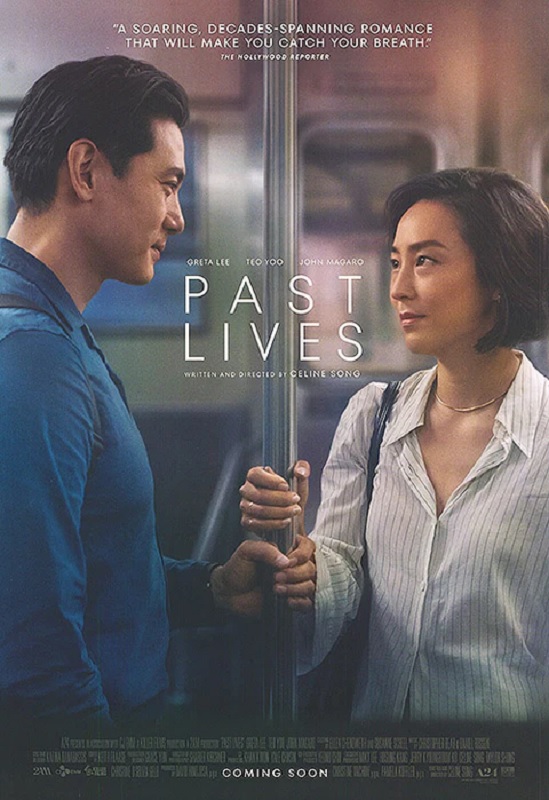

2023 – Past Lives
Sigh… Ok, I’ll just say it. This was an interminably boring film. I’m sorry, but I found it to be slow and pretentious, plodding and uninteresting. Watching people stare at each other without saying anything is not deep. It’s boring. Long and meaningful looks just don’t translate well onto the big screen. While I was watching this movie, I was reminded of those hyper-minimalist French films that are often made fun of. I’m actually only guessing at this, as I’ve never actually seen one of those movies, though they are parodied all the time in pop culture.
And I think maybe there was supposed to be a romantic love triangle thing going on between the only three significant characters in the narrative. There was supposed to be a “who will she end up with” vibe going on. But it didn’t work at all for me. It was just a dull film that, honestly, felt too self-important. It was trying way too hard to be deep, and it just made the whole thing feel forced. The theme was not supposed to be that of unrequited love or missed opportunities. It was about pining for the unknown life that could have been, had fate turned you in a different direction. But I think that even this mark was missed.
The narrative follows a Korean woman whose family immigrated to Canada when she was a small child, and she moved to America as an adult. While going to school in Korea, a twelve-year-old Na Young had a childhood sweetheart named Hae Sung. Her family moves, and we skip to Na Young, now called Nora, and played by actress Greta Lee, as a twenty-four-year-old woman in New York City. . Hae Sung, played by Teo Yoo, has never forgotten her.
Hae Sung looks her up and the two reconnect through video chatting. But Nora wants to focus on her career as a writer, and ends the long distance friendship. While on a writing retreat, she meets and falls in love with Arthur, a gentle, soft-spoken Jewish man, played by John Magaro. The two marry, and it is another twelve years before Hae Song finds her again. Arthur wonders if he is standing in the way of a life Nora could have had with Hae Song, and if she married him only to obtain a green-card. She assures Arthur she loves him and is with him because she wants to be. Hae Song comes to visit her in New York, and the two spend two days together reconnecting again. But after a lot of slow conversation, the two come to realize that Hae Song was less in love with Nora, and more with the idea of her. He missed the twelve-year old he knew, a girl who no longer existed.
This is where the movie tries too hard to be deep and philosophical. Were we really meant for each other? What if you had never left Korea? Did we know each other in a past life? Will we be together in our next life? Unfortunately, as the viewer, I just didn’t care. Because when it came down to it, Nora was happy in the marriage she had chosen, and had no desire to shift her affections to Hae Song. I saw no conflict, and so no resolution was needed. Was there even tension between Hae Song and Arthur? No, there wasn’t. They were both respectful and courteous to each other. Virtually all the emotional content was centered around wistfully wondering what might have been, and I’m sorry, but it didn’t make for a very compelling narrative. It was just uninteresting.
I think my favorite of the three characters was Arthur. He so easily could have been written as a jealous man with feelings of inadequacy. True, he had a little insecurity, but only a little, not enough to make him fearful of losing his wife. He was kind and understanding, and he just seemed like a genuinely nice guy. But that’s just it. He seemed to epitomize the feel of the entire movie. He was ordinary. He was easy and non-threatening. And I think that was supposed to be part of the movie’s charm, its ordinary and easy characters, settings, visuals, dramas, and tensions. It was a slice of life-film that maybe tried a little too hard to be philosophical and emotional.
One of the things about the movie I did like was the music. Written by Christopher Bear and Daniel Rossen, It did a great job of fostering a feeling and an aesthetic of profound melancholy. It was sad and a little heavy handed, but it fit the story. While Hae Song was visiting in New York, it was raining, with gray skies and heavy clouds, weather of which I happen to be very fond. The atmosphere of vague uncertainty and wistful regret was achieved, and I liked it.
I guess what I’m saying, in conclusion, is that this wasn’t a bad movie. But at the same time, I wouldn’t call it a great movie. It was average. It was just a little slow and bland for my tastes, and I wouldn’t have nominated it for Best Picture. And I’m well aware that my opinion is not the popular one. To quote Wikipedia, “On the review aggregator website Rotten Tomatoes, 95% of 300 critics’ reviews are positive, with an average rating of 9.0/10. The website’s consensus reads: “A remarkable debut for writer-director Celine Song, Past Lives uses the bonds between its sensitively sketched central characters to support trenchant observations on the human condition.” But if you ask me, that’s the movie’s downfall, not its power. Too much philosophical thought and not enough engaging drama. But oh well. What do I know?
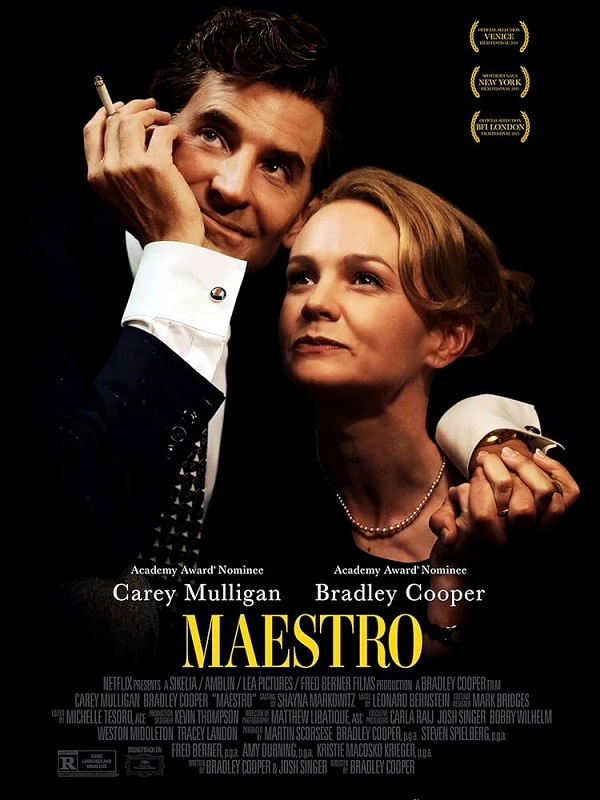

2023 – Maestro
This was a good movie. It was a dramatic biopic about the career and personal life of one of the greatest classical composers of the twentieth century, Leonard Bernstein. It started off with the random, fateful event in 1943 that accelerated his professional career into high-gear, and made him a huge success in the world of classical conducting, and ended not long after the death of his wife in 1978, with a quick snip of him in 1987. But really, the film is more about his relationship with his wife, Felicia, and his homosexuality.
Bradley Cooper, who not only starred as Bernstein, himself, but who also directed the film, did a fantastic job of bringing the man to life. He looked the part, and was able to portray him at various ages over the film’s nearly fifty year time-span. The way they were able to make him look like Bernstein as a young man, and as an old man was amazing. But as much as the film was about him, it was also about his marriage to Felicia Montealegre, expertly played by Carrie Mulligan. And really, those were the only two characters of note in the film.
Maybe three others might be important enough to be mentioned as supporting characters. Matt Bomer played one of Leonard’s lovers, David Oppenheim. Gideon Glick played Tommy Cothran, a musicologist and composer, who was another of Bernstein’s important lovers. And third, I should make mention of Maya Hawke, playing one of Leonard’s daughters, Jamie, who expresses distress over rumors of her father’s homosexual affairs, of which, apparently, there were many.
Yes, there were other actors playing other real-life people in this biopic, but they came on the screen quickly without really being introduced or identified, and were off again just as quickly. You’d have to be already familiar with Bernstein’s life and acquaintances to really know who they were. For example, I don’t remember Aaron Copeland as being a character in the film’s narrative, but he was apparently played by Brian Klugman. Or there was Vincenzo Amato, who played Bruno Zirato, but I have no idea who Bruno Zirato is, or was, and since he had no real significance to the plot, he had no real significance to me.
No, the real interest in the film was the relationship between Leonard and Felicia. It is where all the drama and the romance was centered, and it took up most of the film. Even Bernstein’s prolific career seemed to be secondary to the story of the troubled marriage. You see, Felicia always knew about Leonard’s homosexual dalliances, but she married him anyway, because of his genius, his success, and yes, because of his love. Because the movie made it very clear that despite his sexual preference for men, he was fully in love with Felicia, as well. He supported her in her career, he cared for her when she was diagnosed with cancer, and he mourned for her after her death.
But of the two characters, I often found her to be more interesting. She knew he was gay, and though she didn’t like it, she tolerated it. She was mostly just opposed to his sloppiness in managing his affairs. She objected to how it affected her family and her children. She was the long suffering wife who rarely complained, but at the same time, it was a role she walked into with her eyes open. And when tragedy struck, everything changed. Her struggles with cancer and chemotherapy took their toll. The steady decline of her health was heartbreaking to watch as it played out on the screen.
Cooper and Mulligan were both nominated for acting awards for their performances, and I really think they deserved the recognition. They were both phenomenal and I’d have been surprised if they hadn’t been nominated for Oscars. They both had a realism and a dramatic weight to them that was undeniable. I especially liked Mulligan as she drew my attention each time she was on the screen. The pair had an on-screen chemistry that really drew me in to the story.
And then there was the music. You couldn’t make a movie about Leonard Bernstein without featuring some of his music, and his legendary conducting triumphs. Apparently, Cooper was coached in conducting, specifically paying tribute to Bernstein’s personal style. He really knocked it out of the park. The incredible scene of him conducting Mahler’s Resurrection Symphony at Ely Cathedral was powerful, both dramatically for the plot, and musically. It was emotional and captivating, and Cooper disappeared into the scene. He was Leonard Bernstein!
And the film was also a little educational. For instance, I was not really aware that Bernstein was a drug user or a partier late in his life, and while Maestro didn’t focus on these things, it did mention them, even if it was only in passing. All in all, it was a good movie. But it wasn’t perfect. I just wish I knew more about who certain characters were, and why they were historically significant. Sometimes he’d be talking to someone, and I because I didn’t know who they were, I think I missed some of the importance of what was being said. But that is a pretty minor complaint. Despite that, the drama and romance of the marriage was easy to follow, as was the course of his great career. And that’s what the movie was about.
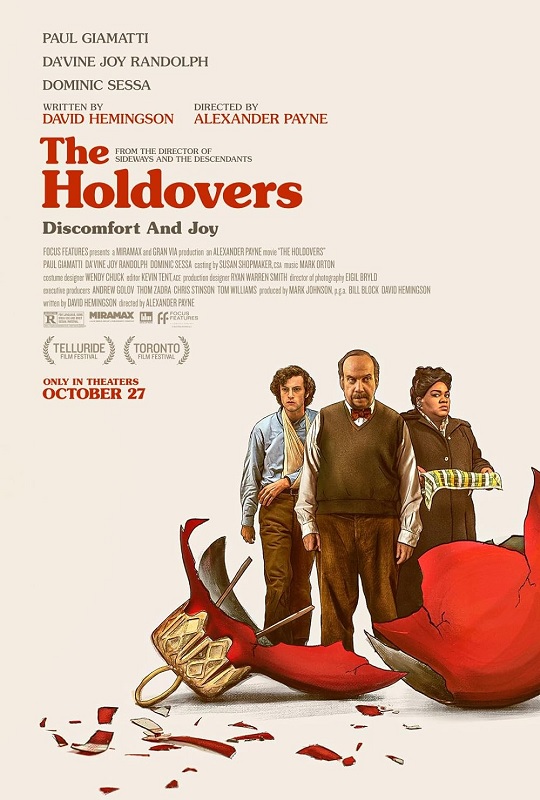

2023 – The Holdovers
Was this a good movie? Yes. Did it have some very good acting? Again, yes. Did it deserve to be nominated for Best Picture? No. I mean, the movie was fine. The plot was fine. The cast was fine, with the exception of Paul Giamatti, who was incredibly good, as usual. The direction, the music, the cinematography, the costuming was all fine. But we’ve all seen this movie before, over and over again. It is an old movie that gets rehashed every few years, and there was nothing new here. Nothing at all. I’m sorry, but five minutes into the movie, I already knew the whole story. I just needed to watch it to fill in the details, and I was not wrong.
Here’s how the story goes. An unlikely group of people are forced to spend time together, in this case a high school teacher, a troubled student, and the woman who runs the cafeteria. They have to spend the Christmas break at the school. At first both the student and the teacher hate each other, but by the end, they learn to not only respect each other, they grow to become friends. Then something bad happens to one of them and they have to part company, which they do with a bit of sadness. They have both grown as individuals, and the future holds a modicum of hope and happiness for each of them. The end.
How many times have we seen this exact story play itself out? Scent of a Woman, Finding Forrester, Charlie Bartlett, St. Vincent, Even Dead Poet’s Society, in a roundabout way. It is a story of unlikely mentorship. The teacher, Paul Hunham, played by Paul Giamatti is an old curmudgeon who teaches ancient history. The student, Angus Tully, played by Dominic Sessa, is the son of a wealthy family whose father is in a mental institution, and whose mother dismisses him. The cafeteria lady, Mary Lamb, played by Da’Vine Joy Randolph, is a woman who is understandably depressed because of the deaths of both her husband, and more recently, her son. Together, the three discover companionship over the depressing Christmas holiday, and learn something about themselves, things that make them better people.
There isn’t much else to say about the rather bland plot. What made the movie good was the acting. It was dramatic, and at times, mildly amusing. But the movie had a generally depressing feeling. The music was all very angsty and depressing, which was actually appropriate for the unhappy characters and the winter setting. And yes, I liked the resolution at the end of the movie, despite its predictability.
There were only three other supporting cast members who were really noteworthy. A fellow teacher at the school who shows a friendly interest in Mr. Hunham is Lydia Crane, played by Mary Preston. Naheem Garcia played the school Janitor who shows a romantic interest in Mrs. Lamb. And the young girl who Angus meets at a Christmas party is Miss Crane’s niece, Elise, played by Darby Lily Lee-Stack. They all did a fine job, but were, honestly, nothing to write home about.
Now, I understand that there were more “holdovers” in the film. There were four other students who had nowhere to go for the Christmas holiday, but they all left after a few scenes, and didn’t show up again until the last ten minutes or so of the film. Technically, they were all the holdovers. All I can say is that it would have been a different movie if they had stayed.
It is interesting to note that this was actually a period piece, taking place in 1970. The clothing and hairstyles were very appropriate, though, if you didn’t know any better, it could have taken place today. Kids still wear their hair long, school uniforms are still school uniforms, and sad old history professors still often wear bow-ties. The only parts in the movie where the 70s is visually apparent is when they take a field trip to Boston. But even then, you really have to look for it.
So what is it about Paul Giamatti that makes him such a good actor? He is always so intentional when he is creating a character. There is a realness to him that is unmistakable. And he has such a wide range of on-screen emotions that he is able to use. He can go from anger to embarrassment, from sympathetic to disdainful, sometimes within the same scene. There is an honesty and earnestness to him that always translates very well on the big screen. And he has very expressive eyes and eyebrows. The scene at the Christmas party where he feels an emotional connection with Miss Crane, only to discover that she is married, is almost heartbreaking to watch. He was that good.
But he wasn’t the only good actor in the film. I also really enjoyed Da’Vine Joy Randolph. There was also a great deal of truth in her performance. I especially liked the scene at the Christmas party where she got drunk. Her anger and loneliness over the loss of her husband and son were very raw and exposed, which she played to perfection. You could see her eyelids get heavy and she had trouble keeping them open. She was so good in that scene. There was a subtlety to the scene that she clearly understood, and she was wonderful. As I said before, it was actually a good movie. Just don’t expect anything new.
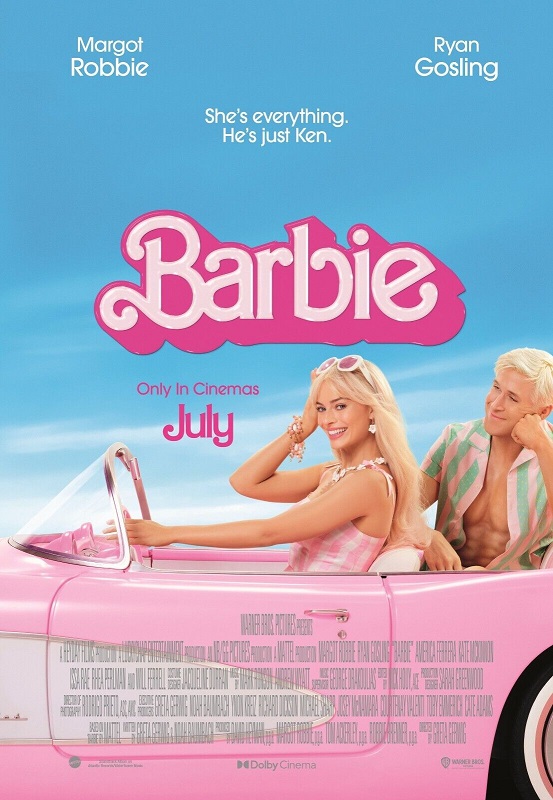

2023 – Barbie
This movie was way better than I was expecting. I mean, I wasn’t expecting it to be bad. After all, I had heard about how much it was loved by people across the spectrum, from adults and children, from men and women, from fans to skeptics. It was good on so many levels. It was visually stunning, cleverly written, perfectly cast, didn’t take itself too seriously, was laugh-out-loud funny, and yet had some serious and relevant commentary on our modern society. It had a lot to say, and said it in a way that was direct and to the point, only a little bit preachy, and yet palatable. And when it comes down to it, it was just plain fun!
First, let me mention the set design, which ties into the intelligent script. About two thirds of the movie takes place in the fictional Barbieland. They filmmakers paid a lot of great attention to the history of the toy line. They featured all the popular items like Barbie’s dream House, and Barbie’s pink Cadillac. They also featured many versions of Barbie that have actually been produced, both the successful ones, and the bombs.
Directed by Greta Gerwig, the film didn’t shy away from looking at both the positive and negative sides of the toy and its impact on the modern world. It is part of what made the movie so controversial, and so good. Wikipedia did a great job of summarizing some of these contradictions, and I’d like to share what I’ve found:
“Gerwig was influenced by her childhood experiences with Barbie. Her mother discouraged her from purchasing such dolls, but eventually allowed her to. Opting to acknowledge the controversial nature of the Barbie doll, Gerwig chose to create a film where she would be both “doing the thing and subverting the thing”, in the sense that she would be celebrating the feminism behind Barbie while also noting the controversial beauty standards associated with it. She was also fascinated by the idea that humans created dolls, which in turn imitate humans, feeling that “we’re in constant conversation with inanimate objects” while also conveying an affirmative message to the audience to “just be yourself and know that that’s enough.” The film deliberately juxtaposed contradictory messaging, such as critiquing consumerism yet glamorizing plastic products; and in the film’s ending, where Barbie desires to be more than just a plastic doll. Gerwig made the film as an “earnest attempt to make amends” between affirming womens’ worth and conveying the impossibility of perfection, which some perceived to be standards associated with Barbie.”
Margot Robbie played the title character of Stereotypical Barbie perfectly. She, as always, was gorgeous, and has a thousand wat smile. Playing opposite her was Ryan Gosling as Beach Ken. They were both awesome! Now, aside from them, Barbieland was populated with lots of other Barbies like President Barbie, Lawyer Barbie, Doctor Barbie, and so on. The Kens had Tourist Ken, Basketball Ken, and Artist Ken. The point was made that Barbieland was run by the Barbies, and that the Kens were only there as their accessories. It flipped the gender stereotypes of the real world, which has historically been run by men, with women as being the ones who are marginalized.
But when Barbie’s perfect world is interrupted with thoughts of mortality, she begins having real-world problems like depression, bad breath, and flat feet. So at the advice of Weird Barbie, played by Kate McKinnon, a Barbie who was played with too hard, and now has chopped up hair, marker lines all over her face, and legs that are generally in the splits, Barbie goes to the real world to find the girl playing with her, in order to clear up all her negative thoughts and heal her. Ken, who can only be happy when he is with Barbie, goes with her.
In the real world, Barbie finds sexism and depression, while Ken finds acceptance and power, even though it is all imagined. He returns to Barbieland and uses what he has learned to take over everything and brainwashing the Barbies into forgetting their empowering careers as Supreme Court Justices and Authors, and taking on submissive roles like casual girlfriends and maids. And that’s the main conflict of the story. Hijinks ensues.
But there was so much more that happened, more than I can fit into this review. America Ferrera and Arianna Greenblatt played Gloria and Sasha, a mother and daughter who are Barbie’s real world owners. Will Farrell played the CEO of Mattel, and Rhea Perlman played the ghost of Mattel’s co-founder and first president, Ruth Handler. And of course, the voice of Hellen Miren shows up periodically as a narrator, who often broke the fourth wall to speak directly to the audience. And I have to make special mention of the music in the opening Barbieland sequences, both the first morning, and the existential morning of Barbie’s difficulties, which sang about what was happening on the screen, using lines like “Ooo, that‘s cold,” when Barbie’s shower put out cold water. It was so funny and clever, and showed that the movie had a great sense of humor. But it was Gloria’s great speech that spelled out the real world problems that modern women have to deal with, which gave the film its appropriate bite. Yeah, Barbie just got real.
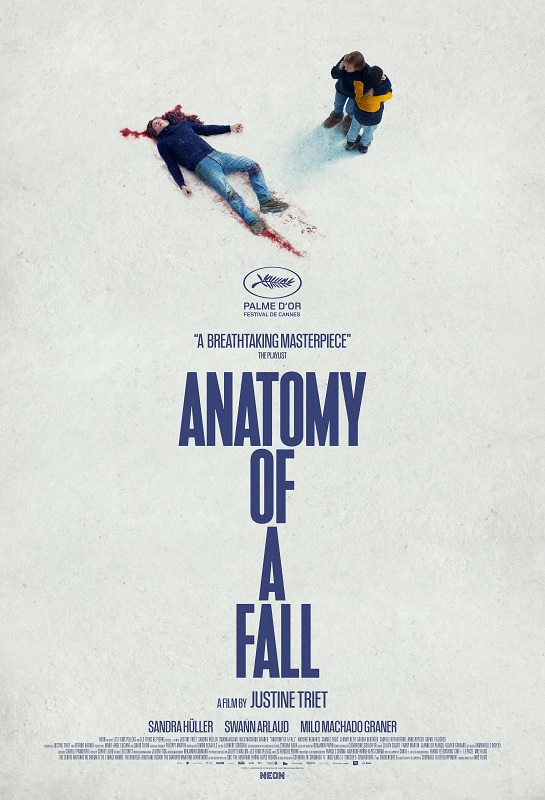

2023 – Anatomy of a Fall
I thought this was a good enough movie, but my goodness! It moved at a snail’s pace. The acting was first-rate and the story was interesting, but it seemed to take forever to get through the two and a half hour run-time. It was a long, deep look into its characters and their relationships. Directed by Justine Triet, it was a French film that used both the English and French languages to move the story, create tension, and exaggerate the difficulties between a French man and his German-born wife. And it also tries to answer the question of whether or not she murdered him by pushing him out of a second story window. And that was where this slow film kept my attention.
What follows is a ‘did she, or didn’t she?’ trial, where Sandra Voyter must defend herself. Sandra is expertly played by Sandra Hüller. Her character is a German author who is put on trial in a French court, where the judge requires everyone to speak in French. Sandra must try to make her case in a language that is not her own, making things more difficult for her. Her visually impaired son, Daniel, wonderfully played by Milo Machado-Graner is a willing participant in the trial, in which he learns things about both his parents that maybe a child would be better off not knowing.
Sandra’s lawyer, Vincent Renzi, played by Swann Arlaud, helps her to prepare for the trial, and produces arguments that put her guilt in question. Meanwhile, the prosecuting attorney, played by Antoine Reinartz, attempts to manipulate the facts of the case against Sandra. And another important member of the cast was Jehnny Beth, playing Marge, Daniel’s state appointed guardian during the trial, who I thought did a fine job, helping to guide the boy through his emotional challenges. They all did a great job and brought a lot to the movie. And, of course there was Daniel’s service dog, Snoop, played by canine actor, Messi.
All the actors in the movie really did a fantastic job, but a few of them really impressed me with their performances. First was the lead actress, Hüller. She was incredibly good. Half her lines had to be delivered in French, the other half in English. She did a great job, which isn’t a surprise, as the film was literally written for her. You can not only hear her native German accent in her Englich dialogue, but you can also read her pragmatic and logical German attitude and mannerisms, even when she is not speaking. Partly, it was the way her character was written, but more than that, it was the way Hüller played her. She was very matter-of-fact about things which one might expect her to be more passionate. For example, while she loved her husband and son very much, there was an emotional distance from both of them that was both undeniable and yet very appropriate for the roll..
But I also have to give a special shout-out to Graner, who played her son. First, he did a great job portraying the visual impairment. There were times when he’d had an unfocused look in his eyes, and sometimes he had to feel for things with his hands as a way of perceiving them. And second, he had a couple of really powerful emotional scenes that was impressive for so young an actor. There was a scene in which he poisons his assistance dog on purpose, as a way of verifying parts of his mother’s testimony, in order to convince himself of her innocence. Once the animal is saved, he breaks down in tears, explaining what he has done, and why.
I also really liked two other actors in the courtroom scenes. The first was Reinartz. He was pitiless and relentless in his efforts to prove Sandra’s guilt, and though I ended up feeling anger towards his character, it was exactly how I think I was supposed to react to him. That says something good about the actor. The other was the judge or, the President, played by Anne Rotger. She had a fairly small supporting roll, but she stood out to me as memorable, as she was always calm and clearly in control of her courtroom.
But as the movie was mostly about the examination of the death of Sandra’s husband, Samuel, played in flashbacks and visualized testimony by Samuel Theis, and the alleged murder trial, the nature of Sandra’s complicated marriage relationship was intensely explored. It examined both the mental and emotional states of both husband and wife, their bonds and their differences. It touched on their careers, and how their individual passions contributed to the marital tensions that preceded the death. It went into Sandra’s success as an author and her husband’s lack of it. It also shined a light on Sandra’s infidelities, and Samuel’s struggles with depression and suicidal episodes. And the movie also explored Sandra’s difficult relationship with her son Daniel.
So yes, there was plenty of drama to keep my attention. I really liked the scene with the recorded audio of a discussion that became an argument, that turned into a fight, which escalated into a physical altercation the day before Samuel’s death. And the film did a very good job of keeping me unsure of Sandra’s innocence or guilt until the very end, so that was good. It wasn’t a bad movie at all. I ultimately enjoyed watching it. It was just so incredibly slow-paced, which, at times, made it a bit of a chore to watch.